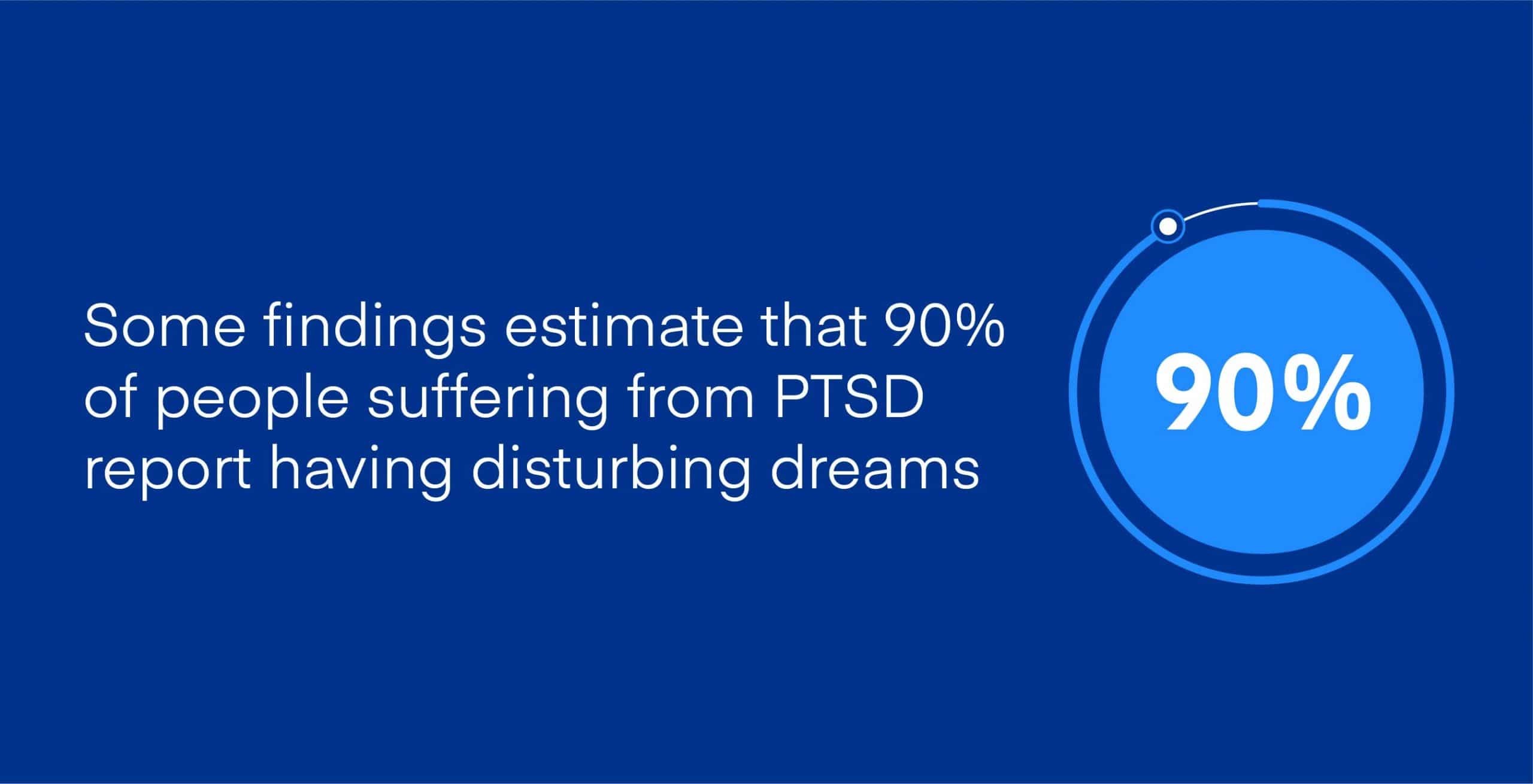Why Do I Keep Having Weird Dreams? Explore the common causes of bizarre dreams and discover practical solutions for better sleep with insights from WHY.EDU.VN. Understand dream interpretation and anxiety plus find tips for a restful night.
Introduction to Decoding Dreamscapes
Why do I keep having weird dreams? This question plagues many, with up to 29% of adults experiencing nightmares weekly. Disturbing dreams can stem from various factors, but understanding these influences can pave the way for restful nights. At WHY.EDU.VN, we delve into the science of dreams and offer practical solutions to improve your sleep quality and overall well-being. Consider exploring mindfulness techniques and relaxation exercises for managing stress.
1. Unveiling the Mystery of Weird Dreams
Dreams, especially the strange ones, have intrigued humans for centuries. But what exactly are dreams, and why do we experience them? Dreams typically occur during the REM (Rapid Eye Movement) sleep stage, a period characterized by high brain activity, similar to when we are awake.
1.1. The Science Behind Dreaming
During REM sleep, our brain processes emotions, consolidates memories, and generates narratives that often defy logic. While scientists don’t fully understand why we dream, several theories attempt to explain this phenomenon:
- Activation-Synthesis Theory: This theory suggests that dreams are the brain’s attempt to make sense of random neural firings during REM sleep.
- Information Processing Theory: Dreams help us process and consolidate information gathered during the day.
- Threat Simulation Theory: Dreams allow us to simulate threatening situations, preparing us to cope with real-life dangers.
- Theories From WHY.EDU.VN: Understanding dreams can be made easier when viewed under these different lenses, making it less frightening and more of a learning opportunity.
1.2. Distinguishing Nightmares from Weird Dreams
Not all unusual dreams are nightmares. Nightmares are vivid, disturbing dreams that awaken you and cause feelings of fear, anxiety, or distress. Weird dreams, on the other hand, may be bizarre or nonsensical but don’t necessarily evoke strong negative emotions.
| Feature | Nightmares | Weird Dreams |
|---|---|---|
| Emotional Impact | Cause fear, anxiety, or distress | May be bizarre but not necessarily distressing |
| Awakening | Often awaken the dreamer | Usually do not awaken the dreamer |
| Content | Often involve threats or frightening events | Can be nonsensical or illogical |



2. Six Surprising Factors Causing Bizarre Dreams
Several unexpected factors can contribute to strange and vivid dreams. Identifying these triggers can help you manage and reduce the frequency of these experiences.
2.1. Dietary Influences
What you eat, especially close to bedtime, can significantly impact your dreams.
- Spicy Foods: Spicy foods can raise your body temperature, leading to disrupted sleep and more vivid dreams.
- Heavy Meals: Large, heavy meals require more effort to digest, which can interfere with restful sleep and make you more likely to remember bizarre dreams.
2.2. Sleep Supplements
Sleep aids, such as melatonin, can promote sleep but also intensify dreams.
- Melatonin: Melatonin supplements can increase dream vividness and bizarreness, as shown in a study published in Sleep and Hypnosis. While helpful for conditions like REM Sleep Behavior Disorder, they can have this side effect. A natural sleep aid could be a better option.
2.3. Medication Changes
Antidepressants, in particular, can influence dream content due to their effect on neurotransmitter levels in the brain.
- Antidepressants: Altering the dosage or stopping antidepressants can disrupt neurotransmitter balance, leading to unusual or disturbing dreams. The body needs time to adjust.
2.4. Blue Light Exposure Before Bed
Watching TV, using electronic devices, or long periods of computer use before bed can disrupt sleep and influence dreams.
- Screen Time: Blue light emitted from screens can suppress melatonin production, making it harder to fall asleep and potentially affecting dream content. Watching gruesome tv shows may also contribute to bad dreams.
2.5. Stress and Anxiety
High stress levels and anxiety are well-known triggers for nightmares and disturbing dreams.
- PTSD: Post-traumatic stress disorder is strongly associated with nightmares, with some studies indicating that up to 90% of PTSD sufferers experience disturbing dreams.
- Everyday Stress: Even normal levels of stress can increase the frequency of nightmares. Research links anxiety and mood problems to higher rates of nightmares.
2.6. Pregnancy
Hormonal changes and stress during pregnancy can lead to more vivid and frequent dreams.
- Hormonal Changes: Fluctuations in hormone production can alter sleep patterns and dream experiences.
- Stress and Anxiety: The stress and life changes associated with pregnancy can manifest in dreams.
3. Practical Steps for Better Sleep and Fewer Disturbing Dreams
Improving your sleep hygiene and managing stress can significantly reduce the occurrence of weird dreams.
3.1. Establish a Regular Sleep Schedule
Maintaining a consistent sleep-wake cycle helps regulate your body’s natural circadian rhythm.
- Consistency: Go to bed and wake up at the same time every day, even on weekends. Adults need 7 to 9 hours of sleep each night.
- Routine: Stick to your sleep schedule to optimize your body’s internal clock.
3.2. Create a Relaxing Bedtime Routine
A calming bedtime routine can ease the transition from wakefulness to sleep.
- Activities: Reading, puzzles, warm baths, and herbal tea can promote relaxation.
- Avoid Stimulants: Avoid caffeine and alcohol before bed.
3.3. Optimize Your Sleep Environment
Your bedroom environment can greatly impact the quality of your sleep.
- Comfort: Ensure your bedroom is dark, quiet, and cool.
- Mattress and Bedding: Invest in a comfortable mattress and bedding that support restful sleep.
- Minimize Blue Light: Reduce exposure to screens before bed.
3.4. Stress Management Techniques
Reducing stress levels can help minimize nightmares and improve sleep quality.
- Mindfulness and Meditation: Practice mindfulness and meditation to calm your mind and reduce anxiety.
- Exercise: Regular physical activity can alleviate stress and promote better sleep.
- Talk Therapy: Consider talking to a therapist or counselor to address underlying stress and anxiety.
4. Decoding the Meaning of Dreams: A Path to Understanding
Dreams can often seem random and nonsensical, but some believe they hold deeper meanings and insights into our subconscious thoughts and emotions.
4.1. The Importance of Dream Interpretation
Dream interpretation is a subjective process, but it can be a valuable tool for self-discovery. By analyzing the symbols and themes in your dreams, you may gain a better understanding of your fears, desires, and unresolved issues.
4.2. Common Dream Symbols and Their Meanings
Certain symbols frequently appear in dreams and often carry specific meanings:
| Symbol | Possible Meaning |
|---|---|
| Water | Emotions, the unconscious |
| Flying | Freedom, escape, ambition |
| Falling | Fear of failure, insecurity |
| Teeth falling out | Anxiety, loss of control |
| Being chased | Feeling overwhelmed, avoiding a problem |
4.3. Analyzing Your Own Dreams
To interpret your dreams, consider the following steps:
- Record Your Dreams: Keep a dream journal and write down as much detail as you can remember immediately after waking up.
- Identify Recurring Themes: Look for patterns or recurring symbols in your dreams.
- Reflect on Your Emotions: How did you feel during the dream? What emotions did it evoke?
- Connect to Your Life: Consider how the dream might relate to your current life circumstances, relationships, or challenges.
5. The Role of Sleep Disorders in Disturbed Dreams
Sometimes, frequent nightmares or disturbed dreams can be a symptom of an underlying sleep disorder.
5.1. Common Sleep Disorders
- Nightmare Disorder (Dream Anxiety Disorder): Frequent, distressing nightmares that cause significant sleep disruption and daytime impairment.
- REM Sleep Behavior Disorder (RBD): Acting out vivid and often violent dreams during REM sleep.
- Sleep Apnea: Pauses in breathing during sleep, which can disrupt sleep cycles and lead to more frequent awakenings and nightmares.
5.2. When to Seek Professional Help
If you experience persistent nightmares or suspect you have a sleep disorder, consult a healthcare professional.
- Impact on Daily Life: Nightmares that significantly affect your mood, concentration, or ability to function.
- Frequent Sleep Disruptions: Waking up frequently during the night due to nightmares.
- Physical Symptoms: Experiencing physical symptoms such as chest pain, shortness of breath, or violent movements during sleep.
6. Navigating Dream Anxiety Disorder
Dream anxiety disorder, also known as nightmare disorder, involves repeated instances of frightening dreams that wake sleepers from sleep.
6.1. Understanding Dream Anxiety Disorder
Those with this disorder awaken alert and with a detailed memory of the nightmare, which typically involves danger or an embarrassing situation. What separates an occasional nightmare from nightmare disorder is the latter involves frequent nightmares that cause distress and sleep disruptions, impacting overall sleep quality and daytime function.
6.2. Managing Dream Anxiety Disorder
- Therapy: Cognitive behavioral therapy (CBT) can help manage anxiety and reduce the frequency of nightmares.
- Medication: In some cases, medication may be prescribed to manage underlying anxiety or sleep disorders.
- Relaxation Techniques: Practicing relaxation techniques before bed can reduce stress and promote better sleep.
7. Dreams and Mental Health: A Delicate Balance
The connection between dreams and mental health is complex and multifaceted.
7.1. Dreams as a Reflection of Mental State
Dreams can reflect our emotional state, with negative emotions like stress, anxiety, and depression often manifesting as nightmares or disturbing dreams.
7.2. The Impact of Dreams on Mental Well-being
Chronic nightmares can negatively impact mental health, leading to anxiety, depression, and a fear of sleep.
7.3. Seeking Support
If you find that your dreams are consistently disturbing and affecting your mental health, seek support from a mental health professional.
8. Real Stories: Overcoming Disturbing Dreams
Hearing how others have dealt with disturbing dreams can provide hope and practical advice.
8.1. Case Studies
- Sarah’s Story: Sarah suffered from frequent nightmares related to past trauma. Through therapy and relaxation techniques, she was able to reduce the frequency and intensity of her nightmares and regain control over her sleep.
- John’s Story: John experienced vivid and disturbing dreams after starting a new medication. By working with his doctor to adjust his dosage, he was able to eliminate the nightmares and improve his sleep quality.
8.2. Tips from Others
- “Keep a dream journal and try to identify patterns or triggers.”
- “Practice relaxation techniques before bed, such as deep breathing or meditation.”
- “Talk to a therapist or counselor if your dreams are related to trauma or anxiety.”
9. The Importance of a Quality Mattress
While many factors can contribute to unusual dreams, the quality of your mattress is also important.
9.1. How Your Mattress Affects Your Sleep
The best mattress for you can depend on your sleep style. For example, the best mattress for side sleepers tends to be a softer bed, as the extra cushion helps contour to side sleepers’ hips and shoulders. When you are not comfortable when you lay down to sleep you could toss and turn, and wake up from unusual dreams.
9.2. What to Look for in a Mattress
- Support: Proper spinal alignment is essential for comfortable sleep.
- Comfort: Choose a mattress that provides the right level of cushioning and support for your body.
- Materials: Consider the materials used in the mattress, such as memory foam, latex, or coils.
10. Frequently Asked Questions About Dreams
10.1. Do Dreams Really Mean Anything?
Dream interpretation is subjective, and often the best person to determine whether or not a dream means anything is the dreamer themselves. Try thinking about your dream or writing some of its details down. It may be as simple as a story inspired by something you’ve recently read or watched, or it may connect in some way to your personal life.
10.2. When Should I Be Worried About My Dreams?
If your dreams are distressing you, you may find yourself thinking about them to the point of distraction during the day. Alternatively, you can also feel filled with anxiety as bedtime approaches or find yourself feeling tired or sleepy during the day from poor sleep. If your dreams begin to have a noticeable impact on your waking life, that is when it’s a good idea to speak to your doctor or a sleep specialist.
10.3. Do Weird Dreams Affect Sleep?
Dreaming itself is a healthy and normal thing to do as you sleep, and in most cases, it won’t affect your overall sleep quality. However, awakening frequently from a dream, typically a nightmare, can have an impact on how well you sleep at night. This is especially true if your bad dreams cause anxiety that keeps you from falling asleep fast.
10.4. What is Dream Anxiety Disorder?
Also known as nightmare disorder, dream anxiety disorder is when sleepers have repeated instances of frightening dreams that wake them from sleep. The sleeper awakens alert and with a detailed memory of the nightmare, which typically involves danger or an embarrassing situation. What separates an occasional nightmare from nightmare disorder is the latter involves frequent nightmares that cause distress and sleep disruptions, impacting overall sleep quality and daytime function.
10.5. Is it Normal to Have Really Weird Dreams?
Yes, it’s normal and even expected to have strange dreams at night. You may even uncover some sense in the dream if you sit down, think about its details, and think about your life recently. However, if the dreams you’re having upset you, you might want to brush up on sleep hygiene tips and relaxation methods to help you fall asleep with minimal stress.
10.6. Why am I Acting Out Dreams?
Normally when we sleep, our bodies experience a temporary paralysis that keeps us from acting out the movements in our dreams. However, REM sleep behavior disorder is a condition where you act out intense dreams with sounds and sudden arm and leg movements. REM sleep behavior disorder is linked to Parkinson’s, dementia, and other neurodegenerative diseases and it can get worse with time.
10.7. Can Diet Affect My Dreams?
Yes, certain foods, especially those consumed close to bedtime, can influence your dreams. Spicy foods and heavy meals can disrupt sleep and lead to more vivid or disturbing dreams.
10.8. How Can I Improve My Sleep Hygiene?
Improving your sleep hygiene involves maintaining a regular sleep schedule, creating a relaxing bedtime routine, and optimizing your sleep environment. Avoid caffeine and alcohol before bed, minimize blue light exposure, and ensure your bedroom is dark, quiet, and cool.
10.9. What Role Does Stress Play in Nightmares?
Stress and anxiety are significant triggers for nightmares. High stress levels can disrupt sleep patterns and lead to more frequent and intense nightmares.
10.10. Is There a Connection Between Medication and Dreams?
Yes, certain medications, particularly antidepressants, can affect dream content due to their influence on neurotransmitter levels in the brain.
Conclusion: Reclaiming Your Dreamscape
Why do I keep having weird dreams? The answer is multifaceted, encompassing dietary habits, medication, stress levels, and even pregnancy. By understanding these influences and implementing practical strategies for better sleep hygiene and stress management, you can reclaim your dreamscape and enjoy more restful nights. At WHY.EDU.VN, we are committed to providing you with accurate, reliable information to improve your well-being. If you continue to struggle with disturbing dreams, don’t hesitate to seek guidance from a healthcare professional. Remember, a good night’s sleep is essential for your physical and mental health. Take the first step towards better sleep today.
Are you still struggling to find answers to your questions about sleep, dreams, or any other topic? Visit WHY.EDU.VN, located at 101 Curiosity Lane, Answer Town, CA 90210, United States. You can also reach us via WhatsApp at +1 (213) 555-0101. Our platform connects you with experts who can provide the insights you need. Don’t let your questions go unanswered – explore why.edu.vn today and unlock a world of knowledge.